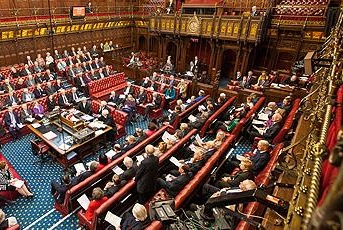Concerns raised include lack of good quality legal advice for unaccompanied migrant children in the UK
The House of Lords EU Home Affairs Sub-Committee has said in a comprehensive new report published today that unaccompanied migrant children are being systematically let down by the UK and other the EU Member States.
 Image credit: UK GovernmentThe 115-page report can be read here in PDF format of here in HTML.
Image credit: UK GovernmentThe 115-page report can be read here in PDF format of here in HTML.
According to the report, around 90,000 unaccompanied children applied for asylum in the EU last year, a large increase from just over 23,000 in 2014. The UK received 3,043 asylum applications by unaccompanied minors in 2015, a 56% increase over the previous year.
Amongst the many concerns raised by the report was the lack of good quality legal advice for unaccompanied migrant children in the UK.
"The provision of legal advice and information of an adequate quality is essential to ensure that the rights of unaccompanied migrant children are properly safeguarded. We are particularly concerned that in the UK the provision of free legal advice has been drastically curtailed," it stated.
In evidence to the Sub-Committee, the Refugee Council said it was "aware of many children (hundreds) with no named social worker and similar numbers who have not been able to access legal advice … This needs to be addressed as a matter of urgency. The asylum process should not begin until a child has had sufficient time to discuss and prepare their case with a legal representative."
While the EU Home Affairs Sub-Committee found that the reception conditions for unaccompanied children varied across the EU, the conditions in some Member States leads the report to conclude that, collectively, Member States are fundamentally failing to comply with their obligations under EU and international law to receive and protect children in a manner that recognises their specific vulnerability.
"Witnesses' accounts paint a harrowing picture of the squalor, destitution and desperation unaccompanied migrant children face across the EU. Reception conditions in several Member States appear to amount to systematic detention," the report states.
Kirsty McNeill, Director of Policy, Advocacy and Campaigns at Save the Children, was quoted in the report as saying that child-specific facilities in Italy and Greece were "completely overwhelmed".
The migrant camps in Calais and Dunkirk in France were criticised in the report as "wholly inadequate." Julie Ward MEP said in her evidence to the EU Home Affairs Sub-Committee: "The conditions in these unofficial camps are much worse than in official camps and, contrary to popular opinion, there are many children and young people living in squalid conditions. Whilst the British and French authorities fail to address the humanitarian crisis through proper collective agreement, the inhabitants in these camps continue to suffer and the children suffer disproportionately."
A House of Lords press release quoted Baroness Prashar, Chairman of the Sub-Committee, as saying: "The current refugee crisis is the greatest humanitarian challenge the EU has faced in its lifetime. At the sharp end of this crisis are unaccompanied migrant children, who are being failed across the board.
"We found a clear failure among EU countries, including the UK, to shoulder their fair share of the burden. We deeply regret the UK Government's reluctance to relocate migrant children to the UK, in particular those living in terrible conditions in the camps near the channel ports.
"It is particularly shocking that so many unaccompanied child migrants are falling out of the system altogether and going missing. How can Member States, including the UK, tolerate a situation where there are more than 10,000 missing migrant children in the EU?
"We urge the EU institutions and the UK Government to address these complex problems urgently. At the end of the day, unaccompanied child migrants are children, first and foremost, and we need to work together to care for them in a decent and humane way."